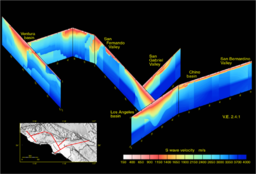Difference between revisions of "CVM-S"
| Line 22: | Line 22: | ||
Earlier version of CVM-S are posted on the SCEC Data Center site: | Earlier version of CVM-S are posted on the SCEC Data Center site: | ||
| − | *[] | + | *[http://www.data.scec.org/3Dvelocity/ CVM-S Model Site] |
== References == | == References == | ||
Kohler, M., H. Magistrale, and R. Clayton, 2003, Mantle heterogeneities and the SCEC three-dimensional seismic velocity model version 3, Bulletin Seismological Society of America 93, 757-774.* | Kohler, M., H. Magistrale, and R. Clayton, 2003, Mantle heterogeneities and the SCEC three-dimensional seismic velocity model version 3, Bulletin Seismological Society of America 93, 757-774.* | ||
Revision as of 19:22, 22 February 2011
The most recent version of CVM-S was released in 2002 and was originally posted for download from the SCEC Data Center SCEC 3D Velocity Models Site.The purpose of the Three-Dimensional Community Velocity Model for Southern California is to provide a unified reference model for the several areas of research that depend of the subsurface velocity structure in their analysis. These include strong motion modeling, seismicity location, and tomographic velocity modeling. It is also hoped that the geologic community will find the basin models useful because they are based on structures and interfaces that are largely derived from geologic structure models. The deeper sediment velocities themselves are obtained from empirical relationships that take into account age of the formation and depth of burial. The coefficients of these relationships are calibrated to sonic logs taken from boreholes in the region. Shallow sediment velocities are taken from geotechnical borehole measurements. Hardrock velocities are based on tomographic studies.
The velocity models are a Fortran code and associated files that are downloaded, compiled, and run locally. The user queries the models by creating an input file of latitude, longitude, and depth values, and the model returns Vp, Vs, and density at each of those points. Some web based interfaces to handle model queries have been developed and are available from the SCEC Community Modeling Environment
The Community Velocity Model has been released in progressive versions. It is now in version 4. It is recommended to use version 4 over previous versions.
Version 4
Version 4 is based on Version 3 with the following differences:
- San Bernardino Valley: A new San Bernardino Valley basement is based on recent USGS inversion of gravity data confirmed by comparison to a seismic reflection line. The new model features a deep trough in the central valley, in contrast to the previous flat-bottomed valley model. The new basement joins smoothly to the relatively shallow Chino basin to the west.
- Salton Trough: A new model is motivated by the needs of TeraShake simulations of southern San Andreas fault events. Depth to basement is defined by a combination of seismic refraction surveys, inversion of gravity observations, surface geology, and boreholes. Sediment velocity-depth gradients depend on the nature of the basement, smoothing merging into deep metasedimentary basement, and having a discontinuity above shallow crystalline basement. The model includes the portion of the Trough south of the international border.
- Vp-density: The new Vp-density relation is based on density measurements from oil well samples in the Los Angeles basin and the San Gabriel Valley, geotechnical boreholes throughout southern California, and 12 oil wells along the LARSE lines. The newly determined Vp-density ratio is constant, in contrast to the old relation. This is true even for low Vp, as defined by the geotechnical data. The new densities are higher, for a given Vp, than the old. This will tend to lower the Poisson ratio, which will lower Vp/Vs; that is, changing the Vp-density relation produces a new Vs model.
Download CVM-S
Most recent CVM-S distribution is posted on the CVM-H web site.
Earlier version of CVM-S are posted on the SCEC Data Center site:
References
Kohler, M., H. Magistrale, and R. Clayton, 2003, Mantle heterogeneities and the SCEC three-dimensional seismic velocity model version 3, Bulletin Seismological Society of America 93, 757-774.*
